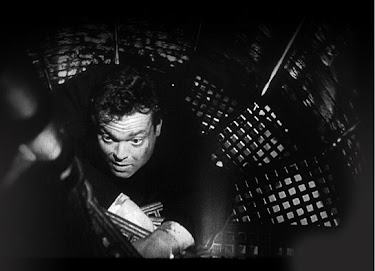Directed by: Otto Preminger
WARNING: Plot and/or ending details may follow!!!
The second of three films that Otto Preminger directed with Gene Tierney, Whirlpool (1949) is also the least of them. Clouded by the dubious Freudian psychology that was sweeping Hollywood in the late 1940s, the film is simply too implausible to prove sufficiently effective, despite the best efforts of the director and stars. I was reasonably willing to accept that David Korvo (José Ferrer) could control Ann Sutton's (Tierney) movements through hypnosis – and, indeed, a similar idea forms the backbone of Frankenheimer's classic thriller, The Manchurian Candidate (1962). However, that the shifty psychologist could hypnotise himself into carrying out murder only hours after voluntarily offering himself for gall-bladder surgery really pushes one's credulity, inspiring laughter rather than intrigue. Perhaps somebody should have told the actors not to take the story quite so seriously, and the resultant lighter mood would have provided some surefire entertainment. As it happens, the principle members all give solid dramatic performances that they probably needn't have bothered with. Gene Tierney was, of course, one of the most stunning actresses to grace the silver screen, but she was also among the most misused. When utilised as a traditional, innocent damsel-in-distress, Tierney's acting is usually dependable without being particularly memorable. However, at least two directors realised that she was at her best when her character's intentions are either ambiguous {see Laura (1944)} or downright evil {see Leave Her to Heaven (1945)}. Given that Preminger directed the first of these, one wonders why he here decided to use Tierney in a purely conventional capacity; he repeated this offence in his follow-up picture, Where the Sidewalk Ends (1950). José Ferrer is smarmily sinister as the psychiatrist abusing his "powers," though the screenplay does him a disservice in the final act. Richard Conte is more subdued than he is in The Big Combo (1955), but nonetheless brings a likable intensity to an otherwise-passive role. Charles Bickford, whom I last saw in Renoir's The Woman on the Beach (1947) here also gives a strong performance.
Gene Tierney was, of course, one of the most stunning actresses to grace the silver screen, but she was also among the most misused. When utilised as a traditional, innocent damsel-in-distress, Tierney's acting is usually dependable without being particularly memorable. However, at least two directors realised that she was at her best when her character's intentions are either ambiguous {see Laura (1944)} or downright evil {see Leave Her to Heaven (1945)}. Given that Preminger directed the first of these, one wonders why he here decided to use Tierney in a purely conventional capacity; he repeated this offence in his follow-up picture, Where the Sidewalk Ends (1950). José Ferrer is smarmily sinister as the psychiatrist abusing his "powers," though the screenplay does him a disservice in the final act. Richard Conte is more subdued than he is in The Big Combo (1955), but nonetheless brings a likable intensity to an otherwise-passive role. Charles Bickford, whom I last saw in Renoir's The Woman on the Beach (1947) here also gives a strong performance.
 Whirlpool is strongest in its middle-act, with Tierney as a wrong-accused innocent for whom every piece of evidence points to her guilt. However, since the story's conclusion is ultimately never in any doubt, much of the film's second half feels as though it is merely going through the motions. I think it would have been more effective had the audience been uncertain of Ann's innocence, just as she herself is unsure. Alfred Hitchcock did something similar just a few years earlier in Spellbound (1945), casting doubt on the virtuousness of Gregory Peck as he is hunted for a crime of which he has no memory. Hinting at the tantalising possibility that Tierney is a murderer would undoubtedly have brought out the actresses' talents, the audience meanwhile tentative about whose story they can trust. For fans of 1940s psychological thrillers, in the same vein as The Dark Mirror (1946) and Secret Beyond the Door… (1947), this is worthwhile viewing, but also a regrettable disappointment.
Whirlpool is strongest in its middle-act, with Tierney as a wrong-accused innocent for whom every piece of evidence points to her guilt. However, since the story's conclusion is ultimately never in any doubt, much of the film's second half feels as though it is merely going through the motions. I think it would have been more effective had the audience been uncertain of Ann's innocence, just as she herself is unsure. Alfred Hitchcock did something similar just a few years earlier in Spellbound (1945), casting doubt on the virtuousness of Gregory Peck as he is hunted for a crime of which he has no memory. Hinting at the tantalising possibility that Tierney is a murderer would undoubtedly have brought out the actresses' talents, the audience meanwhile tentative about whose story they can trust. For fans of 1940s psychological thrillers, in the same vein as The Dark Mirror (1946) and Secret Beyond the Door… (1947), this is worthwhile viewing, but also a regrettable disappointment.
6/10
Currently my #10 film of 1949:
1)
The Third Man (Carol Reed) *
2)
White Heat (Raoul Walsh) *
3)
Kind Hearts and Coronets (Robert Hamer)
4)
A Run for Your Money (Charles Frend)
5)
Nora inu {Stray Dog} (Akira Kurosawa)
6)
She Wore a Yellow Ribbon (John Ford)
7)
Under Capricorn (Alfred Hitchcock)
8)
Whisky Galore! (Alexander Mackendrick)
9)
Passport to Pimlico (Henry Cornelius)
10)
Whirlpool (Otto Preminger) *







_poster.jpg)


No comments:
Post a Comment